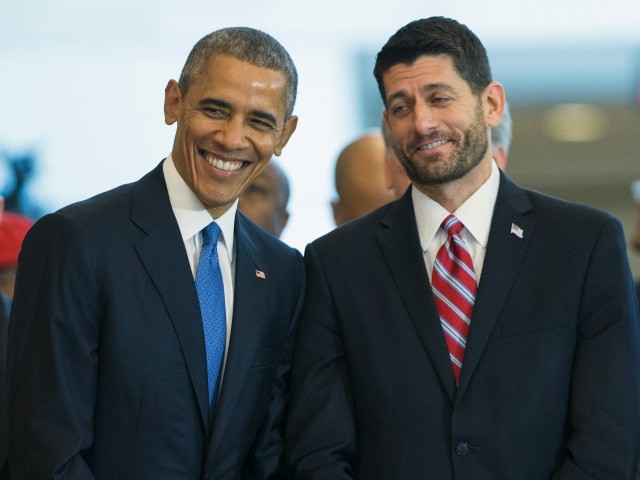As I listen to the back-and-forth between GOP leaders and congressional conservatives over whether the recently-proposed American Health Care Act – touted as Phase One of a three-phase Obamacare repeal-and-replace effort – I’m left wondering if what is being offered thus far is just a starting point or an outright effort to thwart President Donald J. Trump and deny him success in achieving a major campaign pledge.
Because truth be told, something stinks about all of this. Repeal-and-replace legislation shouldn’t be that complicated. It shouldn’t be this controversial. It should be a slam-dunk, given Republican majorities in both chambers of Congress. Getting repeal-and-replace signed by a Republican president who ran on repeal-and-replace is a no-brainer.
Consider:
— No Republican voted for Obamacare: When the Affordable Care Act was signed into law in March 2010, it passed both chambers of Congress without a single Republican vote. The GOP, outnumbered and despondent after the 2008 election losses, couldn’t manage much tactically, but the part was able to unify against a bill that dramatically expanded Medicaid, grew the government and gave Washington nearly universal control over all healthcare in America.
Yet many of those Republicans now are finicky about a repeal measure that winds down the Medicaid expansion and begins the process of returning healthcare to the private sector? Why? (RELATED: New CBO analysis of GOP healthcare bill predicts 14 million fewer Americans covered, but Obamacare didn’t cover everyone, either.)
— What happened to the last repeal? For six years an increasingly larger Republican congressional majority tried to repeal Obamacare, and finally, in January 2016, after 60 votes, the GOP was able to send President Obama a bill that would repeal his signature law and defund Planned Parenthood.
As expected, Obama vetoed it, and there weren’t enough Republicans in the House to override the veto, so the bill went nowhere.
What happened to that bill? And why isn’t that bill – which all Republicans voted for – being offered again? It’s already gone through committees; it’s even got the distinction of being the first Obamacare repeal measure to pass. So where is it, and why isn’t that legislation being offered again for a vote?
— Is the process really that difficult? Some GOP leaders now insist the process is too complicated to fully “repeal Obamacare.” They say repealing and replacing Obamacare has to be done piecemeal, through the budget reconciliation process in the Senate, which only requires a bare majority to pass legislation instead of the 60 votes needed to end filibusters.
Fine. But again, why not send through the same piece of legislation GOP lawmakers sent to Obama in 2016? Why do we have to send something entirely different?
At the time, newly installed House Speaker Paul Ryan, R-Wis., told reporters that the measure sent to the former president was passed via budget reconciliation, which can only be used once per year.
— What is different between then and now? What’s the difference between the legislation sent to Obama versus what is being debated and offered (and opposed universally by conservative lawmakers and organizations) now?
That’s a great question – and one for the Speaker. During his January 2016 presser, he said: “The idea that Obamacare is the law of the land for good is a myth. This law will collapse under its own weight, or it will be repealed. Because all those rules and procedures Senate Democrats have used to block us from doing this? That’s all history. We have now shown that there is a clear path to repealing Obamacare without 60 votes in the Senate. So, next year, if we’re sending this bill to a Republican president, it will get signed into law.” (RELATED: HYPOCRISY: Nancy Pelosi Now Says Americans Have A Right To Know What’s In Obamacare Repeal BEFORE It Passes.)
Well, it’s next year. And there’s a Republican president. What’s the hold-up?
In using budget reconciliation, the GOP majority can’t completely repeal Obamacare, per se, but they can repeal any part of the law that directly impacts federal spending (like the Medicaid expansion, which provides recipients with taxpayer-supported subsidies). But the bill being offered allows Obamacare exchanges (which are collapsing) to remain in effect and continue enrolling new people through 2020. Plus, the Congressional Budget Office estimated that insurance premiums would rise initially, then decline only moderately – and that’s one of Americans’ biggest concerns, the crazy cost of premiums (for lousy coverage) under the current law.
So what gives? Are #nevertrump Republican leaders trying to sabotage the president by denying him victory over a key campaign pledge – Obamcare repeal and replace?
Follow new developments of this story at Medicine.news.
J.D. Heyes is a senior writer for NaturalNews.com and NewsTarget.com, as well as editor of The National Sentinel.
Sources:
TheNationalSentinel.com
Medicine.news



















